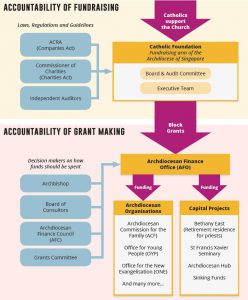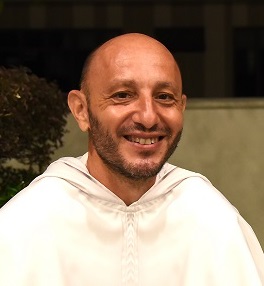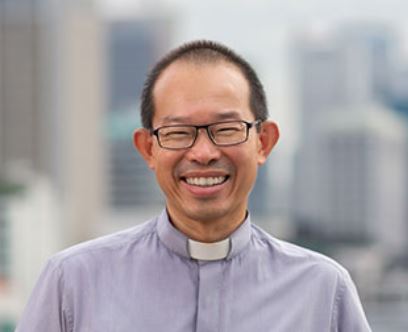Part 4 of 4: Church Governance Series by Msgr Philip Heng
Protecting the Collection and Use of God’s Resources
In this final instalment of the series on governance and financial accountability, Msgr Philip Heng delves into how the archdiocese ensures accountability of the collection and use of its funds through its fundraising arm, the Catholic Foundation.
In the past three articles of this series, we learned about the Church’s canon law, organisational structures, funding pools, fundraising bodies, as well as the archdiocese’s approach to financial governance.
The previous issue in particular showed us how the archdiocese is funded in two ways; through a portion of the Mass collections made in every parish, as well as donations to the Catholic Foundation.
This two-pronged funding model, with the Catholic Foundation serving as the fundraising arm of the archdiocese, helps the Church ensure a greater level of governance and transparency in fundraising for its mission.
A REGISTERED CHARITY
Much transparency and accountability is assured firstly through the legal construct of the Foundation.
The Catholic Foundation was set up in Singapore as a company limited by guarantee (CLG) under the Companies Act, and a registered charity under the Charities Act (UEN No: 201231391k).
This positions the Catholic Foundation as a corporate body that is subject to the laws and regulations of both the Companies Act and the Charities Act, as well as the regulations set by the Commissioner of Charities.
Thus, as with all other registered charities, Catholic Foundation’s fundraising activities follow the rules set out by the Commissioner of Charities.
The Foundation also produces an annual set of financial statements in line with Charity Accounting Standards. These financial statements are audited by a public accounting firm, Deloitte & Touche, and are presented in an annual report where further details of fundraising activities and grants can be found.
In addition, Catholic Foundation seeks to conform with the Code of Charity Governance issued by the Charity Council in Singapore, and discloses its compliance with the Code on the charity portal. The Code identifies leading governance practices which are required of charity boards.
CATHOLIC FOUNDATION BOARD
Accountability of funds raised are also assured through the Foundation’s board of directors. It is made up of both leadership priests and lay personnel with relevant networks and expertise such as accounting, legal, and corporate governance.
All the directors have legal duties, responsibilities and liabilities under the Companies Act and the Charities Act for the activities of the Foundation.
Such a partnership between the clergy and laity of the archdiocese also helps direct the Foundation to constantly keep its focus on the mission of the Church, while maintaining the highest levels of governance in its activities.
GOING BEYOND
In fact, the approach taken by the board and staff of the Foundation in ensuring accountability and transparency goes beyond what is required by the law.
This can be seen firstly through the extent of communication between Catholic Foundation and its stakeholders. A glance at its website, annual report, and other communication collaterals will show the Foundation’s dedication to providing detailed information. Where appropriate, it is provided in a drill down fashion.
For instance, the frequently answered questions (FAQ) on the Foundation’s website comprises 58 questions grouped into 10 categories. It has also distributed guides for parishes to follow when handling contributions to the archdiocese.
In addition, the Foundation regularly communicates its fundraising results to relevant stakeholders and the public. The results of the GIFT campaign, for instance, are provided to parishes and published in Catholic News on a quarterly basis.
The Foundation also seeks accountability to each and every contributor. On top of acknowledging each contribution, all contributors are also given access to their individual accounts with the Foundation on an online portal.
Through this, contributors are able to edit their profiles, view their individual and aggregate contributions to date, and provide direct feedback to the Foundation.

GRANTMAKING
Accountability does not only end at the fundraising process. After raising what it can for the Church, the Foundation subsequently disburses funds through block grants through the archdiocesan finance office (AFO).
The Archdiocesan Finance Council (AFC), headed by the archbishop, decides how funds should be used in the archdiocese.
An archdiocesan grants committee, working closely with the AFO, was also established to work with the various organisations and offices of the archdiocese to streamline their budgets, before making their proposals to the AFC for any approvals.
These structures have facilitated much growth in the archdiocese in the past three years. But as the Lord continues to build us up to be a more vibrant, missionary and evangelistic Church, much more resources are needed to carry out His work.
I urge all Catholics today to pray, get involved, and support our Church in all that it does. Borrowing the words of St Therese of Lisieux, “Let us go forward in peace, our eyes upon heaven, the only one goal of our labours.”
This is the fourth and final article in a series on Church governance by Msgr Philip Heng.
To read his other articles, click on the following:
- Part 1: Structure and Governance of the Catholic Church in Singapore
- Part 2: Financial Governance: Where Canon Law Meets Civil Law
- Part 3: Fundraising for God’s Work



 Clarice Chan, Chairwoman, Original Minds Group
Clarice Chan, Chairwoman, Original Minds Group










 Producer-Presenter, CatholicSG Radio
Producer-Presenter, CatholicSG Radio